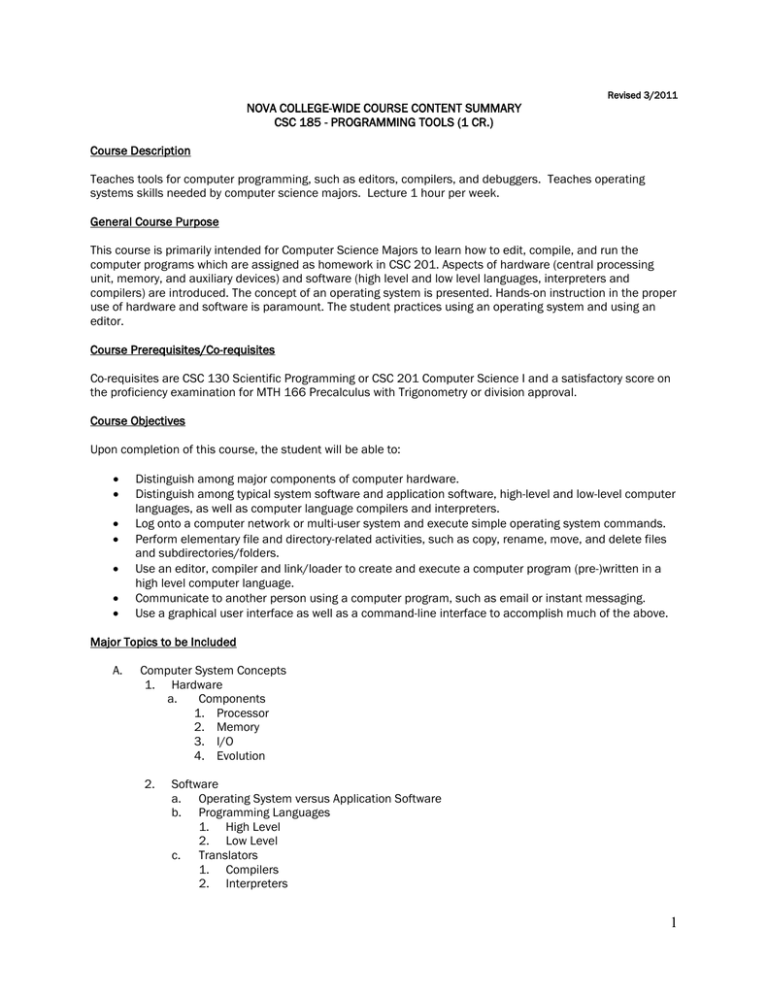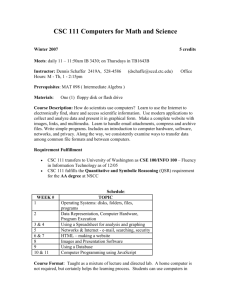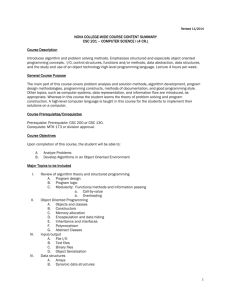CSC 185 - Programming Tools
advertisement

NOVA COLLEGE-WIDE COURSE CONTENT SUMMARY CSC 185 - PROGRAMMING TOOLS (1 CR.) Revised 3/2011 Course Description Teaches tools for computer programming, such as editors, compilers, and debuggers. Teaches operating systems skills needed by computer science majors. Lecture 1 hour per week. General Course Purpose This course is primarily intended for Computer Science Majors to learn how to edit, compile, and run the computer programs which are assigned as homework in CSC 201. Aspects of hardware (central processing unit, memory, and auxiliary devices) and software (high level and low level languages, interpreters and compilers) are introduced. The concept of an operating system is presented. Hands-on instruction in the proper use of hardware and software is paramount. The student practices using an operating system and using an editor. Course Prerequisites/Co-requisites Co-requisites are CSC 130 Scientific Programming or CSC 201 Computer Science I and a satisfactory score on the proficiency examination for MTH 166 Precalculus with Trigonometry or division approval. Course Objectives Upon completion of this course, the student will be able to: • • • • • • • Distinguish among major components of computer hardware. Distinguish among typical system software and application software, high-level and low-level computer languages, as well as computer language compilers and interpreters. Log onto a computer network or multi-user system and execute simple operating system commands. Perform elementary file and directory-related activities, such as copy, rename, move, and delete files and subdirectories/folders. Use an editor, compiler and link/loader to create and execute a computer program (pre-)written in a high level computer language. Communicate to another person using a computer program, such as email or instant messaging. Use a graphical user interface as well as a command-line interface to accomplish much of the above. Major Topics to be Included A. Computer System Concepts 1. Hardware a. Components 1. Processor 2. Memory 3. I/O 4. Evolution 2. Software a. Operating System versus Application Software b. Programming Languages 1. High Level 2. Low Level c. Translators 1. Compilers 2. Interpreters 1 B. Introduction to the Operating System 1. Accounts 2. Services 3. Simple Commands C. Introduction to the File System 1. Copying, Moving, Transferring Files 2. Printing Files 3. Redirection and Pipes 4. File Security D. Create and Execute a Program 1. Using an Editor 2. Using a Compiler 3. Libraries and Linking a Program 4. Running a Program E. Other Optional Content: Operating System and LAN Features 1. Security: Accounts, Login Names, and Passwords 2. Communication a. Email b. Internet Access 3. Graphical User Interfaces Suggested Time Allocation per Topic In order to standardize the core topics of CSC 130 so that a course taught at one campus is equivalent to the same course taught at another campus, the following student-contact-hours per topic are recommended. There are normally 48 student-contact-hours per semester for a three-unit course. The last category, Other Optional Content, leaves ample time for an instructor to tailor the course to special needs or resources. Ref A B C D E Topic Computer System Concepts. Introduction to the O/S Introduction to File System Create and Execute a Program Other Optional Content Exams and quizzes Total Hours 2 2 5 3 2 2 16 Percent 12.5 12.5 31 19 12.5 12.5 100 2

